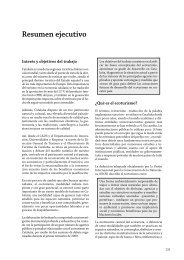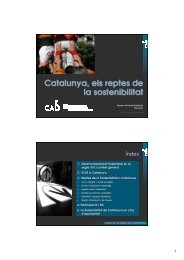Estratègies per al desenvolupament sostenible - Generalitat de ...
Estratègies per al desenvolupament sostenible - Generalitat de ...
Estratègies per al desenvolupament sostenible - Generalitat de ...
Create successful ePaper yourself
Turn your PDF publications into a flip-book with our unique Google optimized e-Paper software.
Scenario an<strong>al</strong>ysis: Developing plausible pictures of the future, as a meansto explore possible strategic options and test their robustness or sensitivity.An<strong>al</strong>ysis and ranking of options: Assessing the costs, benefits and risksof option<strong>al</strong> instruments or programmes to implement the strategy, to submitto objective <strong>de</strong>cision-making – in this way avoiding biased tra<strong>de</strong>-offs.Decision-making without the advantage of good an<strong>al</strong>ysis runs a huge riskof prejudice and misjudgement.Reviewing strategy achievements: Assessing how far sustainable<strong>de</strong>velopment outcomes have been achieved and how they can be correlatedwith NSSD processes. Many of these tasks are those of routine monitoringand ev<strong>al</strong>uation.4.2. The following should be consi<strong>de</strong>red basic principles common to <strong>al</strong>l types ofan<strong>al</strong>ysis:Committing and informing agents in participatory and <strong>de</strong>mocratic processes.Prejudices against information obtained by participatory techniques must beovercome. An<strong>al</strong>ysis and participation are not contradictory. Strategies cannotbe ma<strong>de</strong> by ex<strong>per</strong>ts and bureaucrats. Without participation, necessaryinformation from a very wi<strong>de</strong> range of <strong>per</strong>spectives cannot be obtained andwill otherwise remain hid<strong>de</strong>n.Making use of participatory and accessible methods of an<strong>al</strong>ysis. Participatorymethods and methods of research/action are especi<strong>al</strong>ly suitable as they <strong>al</strong>lowfor learning by action.Preserving the role of the in<strong>de</strong>pen<strong>de</strong>nt ex<strong>per</strong>ts. There are circumstances thatlend weight to the involvement of in<strong>de</strong>pen<strong>de</strong>nt ex<strong>per</strong>ts such as when (1)matters are very contentious or (2) a long, complex an<strong>al</strong>ytic<strong>al</strong> task lies aheador (3) equipment or sophisticated technic<strong>al</strong> skills are required. In these events,in<strong>de</strong>pen<strong>de</strong>nt ex<strong>per</strong>ts should be relatively in<strong>de</strong>pen<strong>de</strong>nt from the politic<strong>al</strong> process,they should be <strong>de</strong>serving of trust and be in contact with <strong>al</strong>l the agents involved,and use a multidisciplinary and holistic approach.142
















